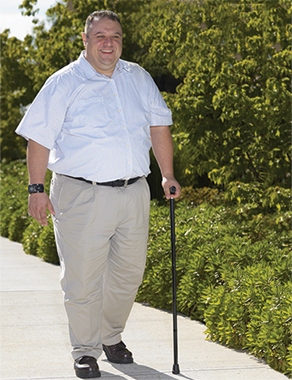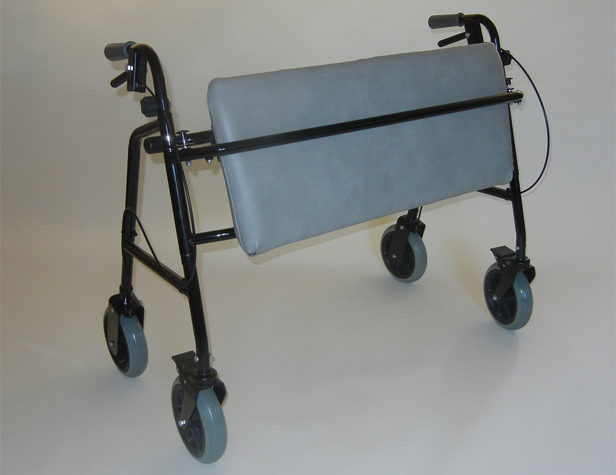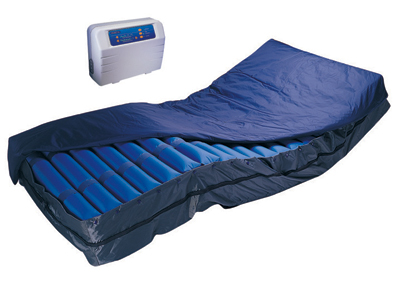Lack of knowledge plagues the bariatric market. It’s a complex field that requires a deep understanding of each customer’s needs, the health issues related to their condition and an ability to explain how special equipment can solve problems—and make both the patient and caregiver safer in the comfort of their own home. Additionally, it’s extremely important to provide training to the caregiver, family members and patient in a sensitive way. Injuries to both caregivers and patients can occur easily if equipment is not used properly. Although bariatrics is a growing market, the expense of doing business is greater. With higher performance requirements, products are simply more expensive to produce and to purchase. The category lost 45 percent of reimbursement in Round 2 of competitive bidding, so providers are challenged to find high-quality products that meet a patient’s requirements and still allow the provider to make a profit. HME providers should be informed about the differences in equipment, weight capacities and features in order to bill equipment properly, says John Medina, vice president of sales, Home Medical Division, Roscoe Medical, Strongsville, Ohio. Specific requirements qualify a patient for bariatric products, and providers must keep the proper documentation. When servicing a patient, the provider should be prepared with a catalog of cash items that the patient or caregiver may want to consider, including convenience items such as commode liners or reachers. Adding cash items to the mix can help to maximize profit-per-patient.
New Products Meet Growth
Roscoe Medical carries a variety of mobility equipment, home care beds, support surfaces, aids for daily living and bath safety products designed for the heaviest of users, with a focus on safety for both the patient and the caregiver. As demand and interest grow, the company continues to add bariatric products in each of its primary product categories.
 Drive Medical offers strength to bariatric shoppers, with comfortable hand grips on canes that feature weight capacities of up to 500 or 600 pounds.
Drive Medical offers strength to bariatric shoppers, with comfortable hand grips on canes that feature weight capacities of up to 500 or 600 pounds.
Roscoe aims its products, programs and services to help providers maximize their profits-per-patient while delivering high quality care. Roscoe products, such as the Legacy mattress or bariatric home care bed, can reduce service calls and deliver better patient care over time, says Medina. Roscoe Medical’s Legacy Series alternating pressure pump and low air loss mattress system helps to improve the circulation of bariatric patients and prevent ulcers. Bariatric patients have an increased risk of developing pressure ulcers, and once a wound develops, it can take a bariatric patient longer to heal. The mattress system helps to prevent an ulcer from happening. A quiet, high-volume pump produces airflow of 15 liters per minute (lpm) with four alternative cycle times. Cell-on-cell design prevents the patient from bottoming out in the event of a power failure—the bottom cell is static and permanently filled with air after setup. Using soft and breathable fabric, the mattress system is a top seller because of the comfort it provides the patient and the reliability it provides the dealer. More and more HME providers are showing interest in bariatrics as a way to differentiate themselves among referral sources and gain a competitive advantage. However, carrying a full line of bariatric equipment takes a lot of warehouse space and typically involves a slower turn on inventory. To offset the issue, Roscoe Medical has developed a Drop Ship Program with bariatric products that are preassembled and can be delivered to a patient’s doorstep. For larger, complex items, Roscoe offers same-day shipping to a provider’s location—they can perform the setup and service without having to warehouse bulky items. Providers that partner with Roscoe have access to a bariatric catalog customized with their logo and contact information. Customized product sheets are also available customized with a local provider’s logo. Customized materials enable providers to market themselves to referral sources as product specialists.
Population Gets Bigger
The bariatric market is a vibrant, emerging market for providers to consider, says Mike Sedlak, global product development manager, beds at Invacare, Elyria, Ohio. As the U.S. population gets physically bigger, providers should adapt their product assortment to meet the needs of the changing population. Consider that back in the 1980s, it was unusual for professional football players to exceed 300 pounds. Today, there are high school linemen at that weight. Providers need to realize this shift in demographics and modify their product offering, says Sedlak. Invacare provides a specific bariatric category on the company’s website to promote awareness—it also provides sell sheets for HME providers. Awareness is key to any provider’s success when selling bariatric products. “Like the clothier who advertises big and tall for men, providers need to make the population aware that they carry products for larger individuals,” says Sedlak. “Second, providers need to carry a wide range of products as well. It doesn’t bode well for a provider to carry bariatric beds, for example, but not bariatric wheelchairs or bariatric personal care products.” Providers who decide to carry bariatric products should do so conscientiously and offer the full range of products, he adds. Providers facing reimbursement challenges for bariatric equipment should consider a number of factors, according to Sedlak. One factor is that the product is more costly due to the additional material needed and the enhanced design required by the added weight capacity. Also, bariatric patients tend to need their products for a longer period of time. Financially, the added cost to procure and handle the product is reflected in the reimbursement amount. Medicare code E0302, an extra-heavy-duty bed, has an average reimbursement of $800 per month compared to nearly $70 for a semi-electric home care bed.
 TFI Healthcare’s bariatric rollator features a 700-pound weight capacity and includes a heavy-duty steel braking system.
TFI Healthcare’s bariatric rollator features a 700-pound weight capacity and includes a heavy-duty steel braking system.
Compassion in how the patient is treated is critical to a provider’s success in bariatrics. Understanding the challenges bariatric patients face on a daily basis helps develop the empathy needed to provide a positive experience, says Sedlak. Invacare markets a full line of products for bariatric patients, including home care beds, wheelchairs, patient lifts and personal care accessories. The company’s BAR750 heavy-duty bariatric bed features enhanced customization specific to each patient. It expands in width from 36 inches to 48 inches and also extends in length from 80 inches to 88 inches. With a 750-pound weight capacity, it caters to a wide variety of users. Four ultra-quiet DC actuators easily reposition the head and foot sections, as well as the bed height. A battery backup comes standard to ensure safety. To sell more bariatric products, providers should seek to expand their base of referral sources, suggests Sedlak. “Creating awareness that you provide bariatric products is great, but you must ensure that you are catering to the right audience,” he adds.
Selection Promotes Brand
Drive Medical, Port Washington, N.Y., has a broad line of bariatric products focusing on functionality and value to improve quality of life, promote independence among the bariatric population and to meet the market’s demand for quality, selection, reliability and value. The products span categories from walking aids, bath safety items and commodes to wheelchairs and hospital-style beds designed and built with the bariatric patient in mind. Drive Medical’s Full Electric Baria-tric Bed is available in three sizes and weight capacities—a 42-inch width with 600-pound weight capacity, a 48-inch width with a 750-pound weight capacity and a 54-inch width with a 1,000-pound weight capacity. The bed is made with all-steel construction with a split-spring, pan-style bed deck with tool-free removable head and foot boards for easy set-up. The range of sizes and weight capacities allows a provider to match the proper product to each patient’s specific needs. One size doesn’t fit all in the bariatric category—even at weight capacities above the 300-pound mark, says Randy Rosen, Drive Medical’s vice president of training. Drive offers several advantages in the bariatric category, says Rosen. The company’s large product selection can boost a provider’s brand and positioning in the market. The diverse offering can increase retail and cash sales, too. Drive also helps providers implement programs to acquire more retail customers in the post- competitive bid era. The company works with providers to offer patient solutions to make them more comfortable and safer in their homes. Finally, Drive allows providers to take advantage of financing programs to help manage cash flow and to access funds to help grow their business. Partnering with Drive can help a provider’s sales team bring incremental sales and help them realize a disproportionate share of growth in the marketplace, says Rosen. In the bariatric category as in other sectors, Drive says focusing on retail and cash sales will bring real value in terms of comfort and safety to help increase each patient’s independence in everyday life. “In this ever-declining reimbursement era, maximizing a patient’s value on each delivery and over the lifetime of a patient is paramount to each provider’s sustainability and profitability,” says Rosen. “Relying only on reimbursable products is an outdated business model.”
 Roscoe Medical’s Legacy XL Bariatric Alternating Pressure Pump and Low Air Loss Mattress System has a weight capacity of 650 pounds.
Roscoe Medical’s Legacy XL Bariatric Alternating Pressure Pump and Low Air Loss Mattress System has a weight capacity of 650 pounds.
Drive supplies a full-line bariatric catalog, in addition to posters to decorate the showroom and planograms that features aids to daily living products. “We have leave-behind brochures and programs such as our fall prevention program to help providers differentiate themselves from the competition,” says Rosen. Interested providers may contact Drive to receive the bariatric catalog.
Niche Market
Joe Battiston, president of TFI Healthcare, Petersburg, Va., emphasizes that there is a difference between being obese and needing bariatric products. Often, high obesity numbers released by the government are cited as evidence of greater demand for bariatric products. However, higher rates of obesity can be misleading and do not change the fact that bariatric equipment is a specialized, niche market that does not involve a large volume of sales. “It’s a niche market, not a volume market,” says Battiston. “Each bariatric patient comes in with a different need—the body shapes are all different. I urge dealers to sell bariatric products, but not to stock the products. If you provide the right item for a patient, you will get the patient back.” The misinterpretation of obesity data to suggest an advantage for bariatrics has drawn many companies into the niche, including some who do not understand product needs. Not all products that are sold as bariatric can really serve bariatric needs, he warns. For example, a bariatric commode must be both wider and deeper to accommodate a bariatric patient. He notes that some products that are sold as bariatric are questionable. He remembers seeing a supposedly bariatric version of a bath bench that looked just like the regular version—no thicker seat, no reinforcements, etc. In any case, a bariatric product that looks like a regular version should weigh more to reflect the additional material used inside the frame to strengthen it to withstand bariatric use. Even worse, some companies—looking for volume—have introduced lower-priced products that claim to be bariatric products—that do not actually meet the patient’s needs. Sadly, in some cases patients are lured away from the niche players that offer the products they really need. Lower costs category-wide have also contributed to lowering reimbursement rates, which challenges true bariatric products to compete against the lower-cost pretenders. Because bariatrics is a niche, providers should approach the category carefully, says Battiston. “We have never pushed dealers to carry a lot of bariatrics,” he says. “They should order what they need.” TFI Healthcare provides a variety of bariatric products—around 75 in all— including walkers, crutches, canes and bathroom accessories. At last fall’s Medtrade in Orlando, TFI Healthcare introduced a 700-pound-capacity rollator with 35 inches between grips (compared to 23 inches between grips of other bariatric rollators). In addition to being wider, the rollator is more substantial and includes a heavy-duty steel braking system. Battiston says that, ironically, carrying a limited number of bariatric items in stock might actually work against the best interests of the patient. For example, a dealer with a 400-pound weight capacity item in stock or on display might be tempted to direct a patient toward the item on hand rather than thoroughly assessing his or her needs and custom- ordering. “We keep items in inventory so dealers can order them as they are needed, so it doesn’t eat up cash flow,” says Battiston. Dealers might sell one or two bariatric commodes a year, and they just don’t know when someone will walk in the door, he says.
Thinking About Bariatrics?
John Medina of Roscoe Medical suggests the following factors for consideration when expanding into the bariatric market:
- Weight and size limitations of the equipment—The physical dimensions, as well as the weight, need to be taken into consideration to make the proper fit.
- Increased performance requirements—Be aware that products simply cost more to produce and, consequentially, to purchase.
- Additional staff—Because products are larger, more employees may be required to assist in proper setup in the patient’s home.
- Education—Train the entire staff for the management of bariatric patients to eliminate the fear of being injured while providing care.




